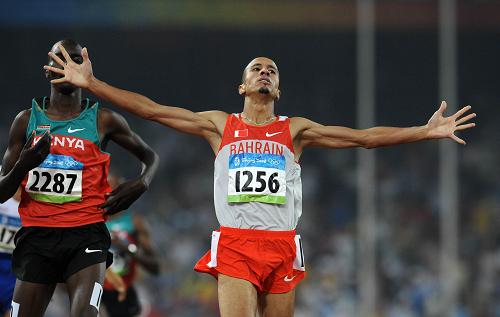
The Olympics have started. They promise to be even more spectacular than any that have gone before. When I was young I dreamed of representing South Africa at the Olympics in Melbourne 1956, but lost the plot. That’s another story but I think I was in with a chance. I had been placed second and third in two events in the South African Championships and won a provincial title.

Well eventually I represented South Africa at World Championships in my age group which in a small way made up for my lapse so many years before, but I’ll never know what might have been.
Anyway what interests me is the way ‘race’ seems to play a part in sport. Superficially looking at the different disciplines, Black male athletes dominate all athletic events except the field events other than long jump. Right from the 100m sprint through to the marathon, though not the 50k walk.
Woman events are divided between races, but I think

 Coppi
Coppi(right)
this will change and eventually be the same as the men’s events.
Blacks are completely absent from cycling, swimming and triathlon. However other sports in which they are absent , sailing, kayaking, and rowing, may be through lack of opportunity.
The interesting thing though is that Blacks originating from West Africa dominate the sprints up to 800m while the longer distances are dominated by Kenyans, and Ethiopians or those living in the highlands of east Africa., with a sprinkling from other parts. It is well known that high altitude helps distance runners and having spent their whole life in the highlands obviously has an impact. But more important is the thousands years of evolution selecting for an improved oxygen transport system from the lungs to the muscles.
So White men can’t jump but Black men can’t swim or ride bicycles or so it seems. What is the reason for this. Apart from the high altitude advantage that blacks have, they also seem to have longer legs and a shorter body and the muscle groups are a different shape, some look like stick insects

with very little body fat.Look at Arthur Wint, Gold medalist in 400m and world record holder in 1948 Olympics in London. Whether they would excel in cycling is not known as so few participate but it is believed that bone density handicaps them in swimming. They just sink. Who will forget that West African swimmer at the Olympics in Sydney when he almost drowned.
There certainly seems a place for affirmative action to help athletes in the disadvantaged groups, whether black, white or yellow. Ha Ha
 Well as expected an African won the marathon, and in record time. So Blacks have taken all the titles but there seems to be a window of opportunity in the middle distances of 800m and 1500m where New Zealander Nick Willis got bronze for coming third. Maybe it doesn't help as he got assistance from on high. The winner was not from Africa but was Rashid Ramzi from Bahrain. The distance is just too far for the muscled West
Well as expected an African won the marathon, and in record time. So Blacks have taken all the titles but there seems to be a window of opportunity in the middle distances of 800m and 1500m where New Zealander Nick Willis got bronze for coming third. Maybe it doesn't help as he got assistance from on high. The winner was not from Africa but was Rashid Ramzi from Bahrain. The distance is just too far for the muscled West  African descendants in the US and Jamaica with a preponderance of fast twitch muscle fibres and too short for the East Africans from the highlands of Kenya and Ethiopia.
African descendants in the US and Jamaica with a preponderance of fast twitch muscle fibres and too short for the East Africans from the highlands of Kenya and Ethiopia.




 2.28 behind the winner Sammy Sanchez and he's only 21 years old. I climbed up there in 1987 so know how hard it is.
2.28 behind the winner Sammy Sanchez and he's only 21 years old. I climbed up there in 1987 so know how hard it is.






